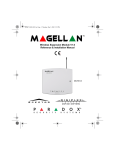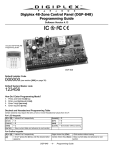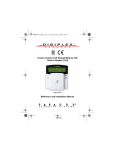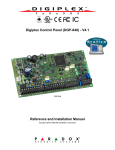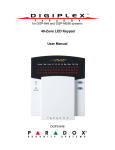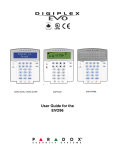Download Digiplex DGP2-641R Installation manual
Transcript
DGP2641-EI14.fm Page -3 Monday, February 20, 2006 9:35 AM LCD Keypad V2.0 DGP2-641BL Reference and Installation Manual DGP-641 DGP2641-EI14.fm Page -2 Monday, February 20, 2006 9:35 AM DGP2641-EI14.fm Page -1 Monday, February 20, 2006 9:35 AM Table of Contents Introduction..................................................... 1 Specifications ...................................................... 1 Installation....................................................... 2 Connecting Keypad Zones .................................. 2 Programmable Output ......................................... 3 Programming .................................................. 4 Entering Module Programming Mode.................. 4 Programming Methods ........................................ 5 Feature Select Programming.................................. 5 Decimal Programming ............................................ 5 Module Broadcast ............................................... Memory Key ........................................................ Download Contents of Memory Key to Keypad... Copy the Keypad Contents to the Memory Key .. 5 6 6 7 System Options .............................................. 8 Partition Assignment ........................................... Display Access Code Entry ................................. Display Exit Delay Timer ..................................... Display Entry Delay Timer................................... Confidential Mode ............................................... 8 8 8 9 9 DGP2641-EI14.fm Page 0 Monday, February 20, 2006 9:35 AM Confidential Mode Timer ................................... Time Display Option .......................................... Muting................................................................ Beep on Exit Delay ............................................ Chime on Zone Closure..................................... Beep on Trouble ................................................ Keypad Tamper Enable..................................... Combus Voltmeter............................................. 10 10 11 11 11 12 12 13 Programmable Output Options ................... 14 PGM State ......................................................... PGM Deactivation Mode.................................... PGM Base Time ................................................ PGM Override.................................................... PGM Timer ........................................................ PGM Activation Event........................................ PGM Deactivation Event ................................... 14 14 15 15 15 16 16 Message Programming ................................ 17 Special Function Keys ....................................... 18 DGP2641-EI14.fm Page 1 Monday, February 20, 2006 9:35 AM 1.0 Introduction Thank you for choosing Paradox Security Systems. Digiplex security systems offer advanced technology and provide reliable security protection and powerful features that are easy to use. The elegant and user-friendly LCD Keypad allows easy access to the security system's functions and information at the touch of a button. Since all programming is accomplished through the keypad, please read this manual carefully. 1.1 Specifications Power input: PGM current limit: Number of inputs: Power indication: Locate indication: Bus fault indication: Anti-tamper switch: LCD: Compatibility: 12 to 16 Vdc, 80mA maximum 50 mA 1 Yellow LED on Green and yellow LEDs flash simultaneously Red and yellow LEDs flash alternately Yes (also used to deactivate locate) Super Twisted Nematic display (STN), wide viewing angle, 2 lines of 16 characters, backlight and contrast adjustable Any Digiplex control panel Digiplex LCD Keypad 1n DGP2641-EI14.fm Page 2 Monday, February 20, 2006 9:35 AM 2.0 Installation The LCD keypad (DGP2-641BL) is connected to the control panel's combus in a star and/or daisy chain configuration. The 4wire combus provides power and two-way communication between the control panel and all modules connected to it. Connect the four terminals labeled red, black, green and yellow of each keypad to the corresponding terminals on the control panel (refer to Figure 2.1 on page 3). Refer to DGP-848 or DGPNE96 Reference & Installation Manual for the maximum allowable installation distance from the control panel. 2.1 Connecting Keypad Zones Each keypad has one traditional hardwired input terminal, allowing you to connect one detector or door contact directly to the keypad. For example, a door contact located at the entry point of an establishment can be wired directly to the input terminal of the entry point keypad instead of wiring the door contact all the way to the control panel. Connect the device to the keypad's input terminal as shown in Figure 2.1 on page 3. In order to communicate its status to the control panel, the keypad's input must be assigned to a zone in the control panel and the zone's parameters must be defined. For more information on zone assignment, please refer to DGP848 or DGP-NE96 Reference & Installation Manual. Please note that even with the ATZ (zone doubling) feature enabled, the keypad supports only one detection device. 2 Reference & Installation Manual DGP2641-EI14.fm Page 3 Monday, February 20, 2006 9:35 AM 2.2 Programmable Output Each keypad has one on-board PGM. A PGM is a programmable output that switches to its opposite state (i.e. a normally open PGM will close) when a specific event has occurred in the system (refer to section 5.0 on page 14). Upon activation, the PGM can provide 50mA to any device connected to it. If the current drawn is to exceed the current limit, a relay should be connected to the PGM as shown in Figure 2.1. Figure 2.1: Connecting the Keypad and Keypad Zone Note: The keypad’s anti-tamper switch will communicate its status to the control panel via the combus. Note: A keypad’s input must be assigned to a zone, keyswitch or virtual input in the control panel. * The keypad zone follows the control panel’s EOL definition. The zone speed is set at 600mS and cannot be programmed. Digiplex LCD Keypad 3n DGP2641-EI14.fm Page 4 Monday, February 20, 2006 9:35 AM 3.0 Programming To program the DGP2-641BL keypad, enter Module Programming Mode and then enter the desired section followed by the required data. When programming the keypad, use the keypad’s programming sheets (found in the Digiplex Modules’ Programming Guide) to keep track of which sections were programmed and how. We strongly recommend you read this entire manual before you begin programming. The LCD keypad can also be programmed using the WinLoad Security System Management Software. For more information, refer to the WinLoad instructions or visit our website at www.paradox.ca. 3.1 Entering Module Programming Mode The keypad, like all other modules in the system, is programmed through the control panel. To do so, you must first enter Module Programming Mode: 1. From Normal Mode press and hold the [0] key. 2. 3. 4. 5. 6. Enter the [INSTALLER CODE] (Default: 000000). Enter section [953] (DGP-848) / [4003] (DGP-NE96). Enter the keypad’s 8-digit [SERIAL NUMBER]. Enter the 3-digit [SECTION] you want to program. Enter the required [DATA]. The control panel will then redirect all programming to the selected keypad. Every time the [CLEAR] key is pressed it will revert to the preceding step, unless entering in data in which case it will erase the current data entry. Please note that the 4 Reference & Installation Manual DGP2641-EI14.fm Page 5 Monday, February 20, 2006 9:35 AM serial number is located on the keypad's PC board or enter section [000] in Step 3 to view the keypad’s serial number. 3.2 Programming Methods The following methods can be used when programming the keypad: 3.2.1 Feature Select Programming Some sections are programmed by enabling or disabling options. Within the sections, numbers from [1] to [8] represent a specific keypad option. Press the key corresponding to the desired option and the digit will appear in the display. This means the option is enabled. Press the key again to remove the digit from the display thereby disabling the option. Press [ENTER] when options are set. 3.2.2 Decimal Programming Some sections require that a decimal value be entered. In this method, any digit from 000 to 255 can be entered. 3.3 Module Broadcast The control panel’s Module Broadcast feature can be used to copy the contents of one keypad to one or more keypads. 1. From Normal Mode press and hold the [0] key. 2. Enter [INSTALLER CODE] (Default: 000000). 3. Enter section [954] (DGP-848) / [4004] (DGP-NE96). 4. Enter the [SERIAL #] of the source keypad. The source is the programmed keypad whose data you want to copy to other keypads. 5. Enter the [SERIAL #] of the destination keypads. The destination is the keypad(s) you want to program with the Digiplex LCD Keypad 5n DGP2641-EI14.fm Page 6 Monday, February 20, 2006 9:35 AM source’s data. If you want to program more than one keypad with the source’s data, enter the serial numbers of the keypads one at a time. 6. Once you have entered the serial numbers of the keypads you want to program, press the [ACC] key. 3.4 Memory Key Sections [510] and [520] Download information to and from an LCD keypad using the memory key (PMC-3). Section [510] = Download all from the memory key (LCD keypad sections [001] to [396] and all messages) to the LCD keypad. Section [520] = Copy the LCD keypad sections [001] to [396] and all messages to the memory key. Only the PMC-3 memory key will function with the LCD keypad. 3.5 Download Contents of Memory Key to Keypad Section [510] 1. Insert the memory key into the keypad’s connector labelled “KEY” (refer to Figure 2.1 on page 3). 2. To download the contents of the memory key, enter the keypad’s programming mode and enter section [510]. 3. When the keypad emits a confirmation beep, wait 5 seconds and remove the memory key after the second confirmation beep. 6 Reference & Installation Manual DGP2641-EI14.fm Page 7 Monday, February 20, 2006 9:35 AM 3.6 Copy the Keypad Contents to the Memory Key Section [520] 1. Insert the memory key onto the keypad’s connector labelled “KEY” (refer to Figure 2.1 on page 3). Ensure that the write protect jumper is ON (refer to Figure 3.1). 2. To copy the contents to the memory key, enter the keypad’s programming mode and enter section [520]. 3. After the confirmation beep, wait 5 seconds and remove the memory key after the second confirmation beep. Set the memory key’s jumper to OFF if you do not wish to accidentally overwrite its contents (refer to Figure 3.1). Figure 3.1: PMC-3 Jumper Settings Digiplex LCD Keypad 7n DGP2641-EI14.fm Page 8 Monday, February 20, 2006 9:35 AM 4.0 System Options 4.1 Partition Assignment Section [001]: Options [1] to [8] Each keypad in the system can be assigned to one or more partitions. In section [001], options [1] to [8] represent partitions 1 through 8 respectively. To assign the keypad to a partition, simply enable the option that corresponds to the desired partition. By default, partitions 1 to 8 are enabled. Section [001] options [5] to [8] can only be used if the keypad is connected to a DGP-NE96 control panel. 4.2 Display Access Code Entry Section [003]: Option [1] The digits of the user access codes can be displayed on the LCD screen when they are entered. Option [1] OFF = Digits are replaced by a * (default) Option [1] ON = Access Code digits will be displayed 4.3 Display Exit Delay Timer Section [003]: Option [2] Based on the user's needs, an Exit Delay Timer will be programmed to provide the user time to exit the partition before the system is armed. The Exit Delay Timer's countdown can be displayed on the LCD screen. Option [2] OFF= Will not display Exit Delay timer (default) Option [2] ON= LCD screen will display Exit Delay timer 8 Reference & Installation Manual DGP2641-EI14.fm Page 9 Monday, February 20, 2006 9:35 AM 4.4 Display Entry Delay Timer Section [003]: Option [3] Based on the user's needs, an Entry Delay Timer will be programmed to provide the user time to enter their user access code before the alarm is triggered. The Entry Delay Timer's countdown can be displayed on the LCD screen. Option [3] OFF= Will not display the Entry Delay Timer (default) Option [3] ON= LCD screen will display Entry Delay Timer 4.5 Confidential Mode Section [003]: Options [4] and [5] If the Confidential Mode is enabled and no actions are performed on the keypad for a period of time, the LCD screen will appear as shown in Figure 4.1 (page 10) and the “AC” and “STATUS” LED will be off until either a button is pressed or an access code is entered. The period of time in which no action is performed is defined by the Confidential Mode Timer (005-255 seconds; refer to section 4.6 on page 10). Confidential Mode is activated by enabling option [4]. Option [5] regulates whether the LCD screen will be activated at the touch of a button or only when an access code is entered. Once the LCD screen is activated (by code or button), Normal Mode will appear and display the date and time as shown in Figure 4.1 on page 10. The status of the areas, the open zones for every area the keypad is assigned, the Alarm Memory Display (if necessary) and the Trouble Display (if necessary. See DGP-848 or DGP-NE96 User Manual) will also scroll on the LCD screen. Digiplex LCD Keypad 9n DGP2641-EI14.fm Page 10 Monday, February 20, 2006 9:35 AM Option [4] OFF = Normal Mode (default) Option [4] ON = Confidential Mode Option [5] OFF = LCD screen activated by entering an access code (default) Option [5] ON = LCD screen activated by pressing a button Figure 4.1: LCD Screen 4.6 Confidential Mode Timer Section [007] Section [007] determines the amount of time without action before the keypad enters Confidential Mode. For more information on Confidential Mode, refer to “Confidential Mode” on page 9. The Confidential Mode Timer can be set from 005 seconds to 255 seconds. Default: 120 seconds. 4.7 Time Display Option Section [003]: Option [8] The LCD keypad comes with a time display option that can display the date as year/month/day or as day/month/year. Option [8] OFF = Date displayed as yy/mm/dd (default) Option [8] ON = Date displayed as dd/mm/yy 10 Reference & Installation Manual DGP2641-EI14.fm Page 11 Monday, February 20, 2006 9:35 AM 4.8 Muting Section [004]: Option [1] The keypad can be programmed not to emit audible sounds, including Chimed zones. During Muting, the keypad will only emit the Confirmation Beep, Rejection Beep, and beep when a button is pressed. Option [1] OFF = Audible sounds (default) Option [1] ON = Mute 4.9 Beep on Exit Delay Section [004]: Option [2] The keypad can beep once every second during the Exit Delay Timer. During the final 10 seconds, it will beep more rapidly to provide a final warning before the area is armed. Option [2] OFF= Exit Delay beep disabled Option [2] ON= Exit Delay beep enabled (default) 4.10 Chime on Zone Closure Section [004]: Option [4] During the Chime Zone Time Period that the user sets, the keypad can emit an intermittent beep whenever a zone with the Chime feature enabled closes (see DGP-848 or DGP-NE96 User Manual for details on Chime Zones). If the user does not set the Chime Zone Time Period and this option is enabled, the Chime Zones will always beep upon closure. Option [4] OFF = Chime on Zone Closure disabled (default) Option [4] ON = Chime on Zone Closure enabled Digiplex LCD Keypad 11n DGP2641-EI14.fm Page 12 Monday, February 20, 2006 9:35 AM 4.11 Beep on Trouble Section [005]: Options [1] to [4] Potential troubles have been sorted into groups. With these options enabled, the keypad will emit an intermittent beep tone whenever a trouble condition from the Trouble Groups occurs in the system. The intermittent beep will remain activated until the user enters the Trouble Display or if the trouble is resolved. For a list of the troubles, see the DGP-848 or DGP-NE96 Reference and Installation Manual. The intermittent beep will be reinitialized whenever the trouble condition re-occurs. Option [1] OFF = Beep disabled: System Troubles and Clock Loss (default) Option [1] ON = Beep enabled: System Troubles and Clock Loss Option [2] OFF = Beep disabled: Communicator Troubles (default) Option [2] ON = Beep enabled: Communicator Troubles Option [3] OFF = Beep disabled: Module and Bus Troubles (default) Option [3] ON = Beep enabled: Module and Bus Troubles Option [4] OFF = Beep disabled: all Zone Troubles (default) Option [4] ON = Beep enabled: all Zone Troubles 4.12 Keypad Tamper Enable Section [006]: Option [5] When tamper is enabled and the keypad's on-board anti-tamper switch is triggered, the keypad will send a Tamper report to the control panel via the combus. 12 Reference & Installation Manual DGP2641-EI14.fm Page 13 Monday, February 20, 2006 9:35 AM Option [5] OFF = Keypad's tamper is disabled (default) Option [5] ON = Keypad's tamper is enabled 4.13 Combus Voltmeter The combus Voltmeter provides a real-time display of the voltage so you can verify if the bus is supplying sufficient power at the keypad’s location. The readings will appear on the LCD screen. A reading of 10.5V indicates that the voltage is too low. This may occur when too many modules are connected to the bus, a module is installed too far from the panel or if the system is running on the battery. In some cases adding an external power supply may correct the situation. 1. From Normal Mode press and hold the [0] key. 2. Enter the [INSTALLER CODE] (Default: 000000). 3. Press [ACC]. The voltage may drop during the control panel battery test. Digiplex LCD Keypad 13n DGP2641-EI14.fm Page 14 Monday, February 20, 2006 9:35 AM 5.0 Programmable Output Options 5.1 PGM State Section [006]: Option [1] The keypad's on-board PGM can be set as normally open or normally closed. When an open PGM is activated, it will close the circuit from ground and enable any devices connected to it. When a closed PGM is activated, it will open the circuit and disable any devices connected to it. When the PGM Activation Event occurs (see section 5.6), the PGM will switch to its opposite state (i.e. open to closed or closed to open). Option [1] OFF= PGM is Normally Open (default) Option [1] ON= PGM is Normally Closed The PGM can provide 50mA to any device connected to it. 5.2 PGM Deactivation Mode Section [006]: Option [2] If the keypad is in PGM Timed Mode, the keypad's on-board PGM will be deactivated according to the PGM Timer (see section 5.5 below) instead of the PGM Deactivation Event. Option [2] OFF = Deactivates on PGM Deactivation Event (default) Option [2] ON = PGM will deactivate according to the PGM Timer 14 Reference & Installation Manual DGP2641-EI14.fm Page 15 Monday, February 20, 2006 9:35 AM 5.3 PGM Base Time Section [006]: Option [3] If the keypad's on-board PGM is set in PGM Timed Mode (see section 5.2 on page 14) you must define whether the value programmed in section [008] is in minutes or seconds. Option [3] OFF = PGM Base Time is 1 second (default) Option [3] ON = PGM Base Time is 1 minute 5.4 PGM Override Section [006]: Option [4] When the PGM override is enabled, the keypad's on-board PGM will ignore PGM Activation Events (section 5.6 on page 16), PGM Deactivation Events (section 5.7 on page 16), and PGM Timers (section 5.5 on page 15). It will remain in its normal state until the PGM Override is disabled. This option may be used to test the PGM connections. Option [4] OFF = PGM Override disabled (default) Option [4] ON = PGM Override enabled 5.5 PGM Timer Section [008] If the keypad's on-board PGM is in PGM Timed Mode, the value programmed in section [008] represents how long the PGM will remain in its opposite state (see section 5.1 on page 14) after being activated. To program the timer, enter a 3-digit decimal value (000 to 255) in section [008]. The 3-digit value will be multiplied by the PGM Base Time of 1 second or 1 minute (see section 5.3 above). Default: 5 seconds. Digiplex LCD Keypad 15n DGP2641-EI14.fm Page 16 Monday, February 20, 2006 9:35 AM 5.6 PGM Activation Event Sections [009] to [012] The PGM Activation Event determines which event will activate the keypad's on-board PGM output. The Event Group specifies the event, the Feature Group identifies the source, and the Start # and End # sets the range within the Feature Group. Use the PGM Programming Table in the Digiplex Modules’ Programming Guide to program the keypad’s PGM Activation Event. Enter the sections that correspond to the Event Group, Feature Group, Start # and End # of the PGM and enter the required data. PGM Event Group Feature Group Start # End # [009] [010] [011] [012] 5.7 PGM Deactivation Event Sections [013] to [016] If the PGM Deactivation Option (section 5.2 on page 14) is set to follow the PGM Deactivation event, the PGM will return to its normal state when the event programmed in sections [013] to [016] occurs. The Event Group specifies the event, the Feature Group identifies the source, and the Start # and End # sets the range within the Feature Group. Use the PGM Programming Table in the Digiplex Modules’ Programming Guide to program the keypad’s PGM Activation Event. Enter the sections that correspond to the Event Group, Feature Group, Start # and End # of the PGM and enter the required data. PGM Event Group Feature Group Start # End # [013] [014] [015] [016] 16 Reference & Installation Manual DGP2641-EI14.fm Page 17 Monday, February 20, 2006 9:35 AM 6.0 Message Programming Sections [101] to [148], [200] to [204], and [301] to [396] Each section contains one message with a maximum of 16 characters. For more details and to record any changes, use the Digiplex Modules’ Programming Guide. The DGP-NE96 control panel has up to 8 partitions, 96 zones and up to 999 user codes. The LCD keypad only allows you to program the messages for up to 4 partitions, 48 zones and 96 user codes. The rest of the messages can be programmed directly into the DGPNE96 control panel. Refer to the DGP-NE96 Reference & Installation Manual and to the DGP-NE96 Programming Guide for more details. Section [101] to [148] = “Zone 01” to “Zone 48” respectively Section [200] = “Paradox Security” Section [201] to [204] = “First Area”, “Second Area”, “Third Area”, and “Fourth Area” respectively Section [301] to [396] = “Code 01” to “Code 96” respectively After entering the section corresponding to the desired message, use the Message Programming Keys (refer to Table 6.1 on page 18) and the Special Function Keys (refer to page 18) to change the message to suit your installation needs. For example, section [101] “ZONE 01” can be changed to “FRONT DOOR”. Digiplex LCD Keypad 17n DGP2641-EI14.fm Page 18 Monday, February 20, 2006 9:35 AM Table 6.1: Message Programming Keys Key Press Key Once Press Key Twice Press Key Three Times [1] [2] [3] [4] [5] [6] [7] [8] [9] A D G J M P S V Y B E H K N Q T W Z C F I L O R U X 6.1 Special Function Keys [STAY] - Insert Space Pressing the [STAY] key inserts a blank space in the current cursor position. [FORCE] - Delete Pressing the [FORCE] key will delete the character or blank space found at the current cursor position. [ARM] - Delete Until the End Pressing the [ARM] key will delete all characters and spaces to the right of the cursor and at the cursor's position. [DISARM] - Numeric Keys / Alphanumeric Keys Every time the [DISARM] key is pressed it will toggle numeric keys to alphanumeric keys and vice versa. Numeric: Keys [0] to [9] represent numbers 0 to 9. 18 Reference & Installation Manual DGP2641-EI14.fm Page 19 Monday, February 20, 2006 9:35 AM [BYP] - Lower Case / Upper Case Every time the [BYP] key is pressed it will toggle the case setting from lower to upper case and vice versa. [MEM] - Special Characters After pressing the [MEM] key, the cursor will turn into a flashing black square. Using Table 6.2 on page 20, enter the 3-digit number that represents the desired symbol. Digiplex LCD Keypad 19n DGP2641-EI14.fm Page 20 Monday, February 20, 2006 9:35 AM Table 6.2: Special Characters Catalog 20 Reference & Installation Manual DGP2641-EI14.fm Page 21 Monday, February 20, 2006 9:35 AM Warranty Paradox Security Systems Ltd. (“Seller”) warrants its products to be free from defects in materials and workmanship under normal use for a period of one year. Except as specifically stated herein, all express or implied warranties whatsoever, statutory or otherwise, including without limitation, any implied warranty of merchantability and fitness for a particular purpose, are expressly excluded. Because Seller does not install or connect the products and because the products may be used in conjunction with products not manufactured by Seller, Seller cannot guarantee the performance of the security system and shall not be responsible for circumstances resulting from the product’s inability to operate. Seller obligation and liability under this warranty is expressly limited to repairing or replacing, at Seller's option, any product not meeting the specifications. Returns must include proof of purchase and be within the warranty period. In no event shall the Seller be liable to the buyer or any other person for any loss or damages whether direct or indirect or consequential or incidental, including without limitation, any damages for lost profits stolen goods, or claims by any other party, caused by defective goods or otherwise arising from the improper, incorrect or otherwise faulty installation or use of the merchandise sold. Notwithstanding the preceding paragraph, the Seller’s maximum liability will be strictly limited to the purchase price of the defective product. Your use of this product signifies your acceptance of this warranty. BEWARE: Dealers, installers and/or others selling the product are not authorized to modify this warranty or make additional warranties that are binding on the Seller. © 2002-2005 Paradox Security Systems Ltd. All rights reserved. Specifications may change without prior notice. One or more of the following US patents may apply: 6215399, 6111256, 5751803, 5721542, 5287111, 5119069, 5077549, 5920259 and 5886632. Canadian and international patents may also apply. WinLoad and Digiplex are trademarks or registered trademarks of Paradox Security Systems Ltd. or its affiliates in Canada, the United States and/or other countries. Digiplex LCD Keypad 21n DGP2641-EI14.fm Page 22 Monday, February 20, 2006 9:35 AM Notes DGP2641-EI14.fm Page 23 Monday, February 20, 2006 9:35 AM DGP2641-EI14.fm Page 24 Monday, February 20, 2006 9:35 AM For technical support in Canada or the U.S., call 1-800-791-1919 for English or 1-866-912-0600 for French, Monday to Friday from 8:00 a.m. to 8:00 p.m. EST. For technical support outside Canada and the U.S., call 00-1-450-491-7444, Monday to Friday from 8:00 a.m. to 8:00 p.m. EST. Please feel free to visit our website at www.paradox.ca. 780 Industriel Blvd., Saint-Eustache (Quebec) J7R 5V3 CANADA Tel.: (450) 491-7444 Fax: (450) 491-2313 www.paradox.ca PRINTED IN CANADA - 02/2006 DGP2641-EI14






























